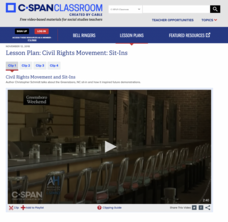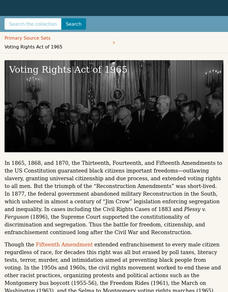K20 LEARN
Plessy v. Ferguson: An Individual's Response to Oppression
After generating research questions rated to segregation, groups are given a primary source document (Jim Crow Laws, Black Codes, Plessy v. Ferguson, etc.) and craft a presentation that details the key elements of their assigned...
Teaching Tolerance
Using Photographs to Teach Social Justice | Confronting Unjust Practices
A powerful photograph of the Freedom Riders of 1961 launches an examination of the de jure and de facto injustices that the civil rights movement of the 1950s and 1960s addressed. Young historians first watch a video and read the Supreme...
Teaching Tolerance
Jim Crow as a Form of Racialized Social Control
Just because slavery was illegal doesn't mean it went away ... Jim Crow Laws took its place. An eye-opening lesson focuses on how Jim Crow Laws were used as a form of racial social control against African Americans in the United States....
Teaching Tolerance
Mass Incarceration as a Form of Racialized Social Control
Mass incarceration: A result of a tough stance on crime or racial discrimination, you decide. Academics explore the history and reasons behind mass incarcerations in the United States and its impact on ethnic communities. The...
Teaching Tolerance
The War on Drugs—Mechanisms and Effects
The war on drugs doesn't have definite results. An interesting lesson examines the social, political, and economic effect of the war on drugs. Academics learn how the war on drugs has led to mass incarcerations and negatively affected...
Teaching Tolerance
Racial Disparity in the Criminal Justice System
Explore the impact of the war on drugs in a thought-provoking lesson for high school academics. Young historians delve into the world of the criminal justice system and the racial disparity that occurs in the US. The resource provides...
Teaching Tolerance
Understanding the Prison Label
Break the chain. An engaging lesson examines why it is so hard to break free of the prison system in the US. Academics participate in a reader's theater, read primary sources, and discuss their thoughts. The lesson explains the hardships...
Teaching Tolerance
Dismantling Racial Caste
It's time to end racism. The final installment of the series encourages scholars to consider what is needed to ended the racial caste system in the U.S. Young historians complete group discussion, written prompt, and a hands-on-activity...
National Endowment for the Humanities
The Freedom Riders and the Popular Music of the Civil Rights Movement
The Civil Rights Movement of the 1960s marched to its own beat—literally. Using songs from the era, as well as other primary sources such as King's "I Have a Dream" speech, class members analyze lyrics to discover how music and protest...
C-SPAN
Civil Rights Movement: Sit-Ins
Part of the protests of the Civil Rights Movement were small scale sit-ins at lunch counters. This form of on-the-ground activism is the focus of a C-SPAN resource that includes four video-clips about the sit-ins by pupils at a lunch...
C-SPAN
Last Days of Martin Luther King, Jr.
On April 4, 1968, Dr. Martin Luther King, Jr. was assassinated in Memphis, Tennessee. Four video clips reveal the events of that time, including the shift in the focus of the Civil Rights Movement, the aftermath of the assassination, and...
National Park Service
The Selma to Montgomery Voting Rights March: Shaking the Conscience of the Nation
Travel back in time to examine how tragic events can spur positive change. Scholars explore the impact of the Selma Voting Rights March, including the tragic loss of life and the later signing of the Voting Rights Act of 1965. Academics...
US House of Representatives
Keeping the Faith: African Americans Return to Congress, 1929–1970
The third lesson plan in a unit that traces the history of African Americans serving in the US Congress examines the period from 1929 through 1970. After reading a contextual essay that details the few African Americans elected to...
Digital Public Library of America
Voting Rights Act of 1965
Despite the passing of the Thirteenth, Fourteenth, and Fifteenth Amendments, as well as the passing of the Voting Rights Act of 1965, the struggle to ensure fair voter registration and election procedures continues. Young historians...
US House of Representatives
Hispanic-American Members of Congress in the Civil Rights Era, 1945–1977
Debates around immigration in the news are not new, but they are a defining feature of the Hispanic American experience throughout the twentieth century. Looking through the lens of Hispanic Americans in Congress, class members explore...
DocsTeach
Civil Rights or Freedom? When Vietnam and the Civil Rights Movement Clashed
When Martin Luther King Jr. took a stand against the Vietnam War, interests collided. With a letter from Jackie Robinson to Lyndon B. Johnson, the baseball legend urges the president to remain firm in his resolve for civil rights. Young...
Newseum
The Freedom to Make a Change
As part of a study of the First Amendment, young historians research instances when individuals or groups used the First Amendment to change the United State's laws or policies. Teams are each assigned a different case study. With the...
Newseum
Civil Rights: Identifying Community Issues
As part of the social, economic, and legal/political civil rights study, class members brainstorm a list of current civil rights issues that affect their community. Individuals or pairs select one issue to research further. The class...
Newseum
Civil Rights: The Five Freedoms
After a close reading of the First Amendment and the five freedoms it guarantees, class members examine the civil rights timeline to see how civil rights groups applied these freedoms to create change. Using the issue the class chose in...
Newseum
Making a Change: Letter From Birmingham Jail
Martin Luther King Jr.'s "Letter From Birmingham Jail" was written in response to "A Call for Unity," written by eight white ministers from Birmingham and published in the local newspaper. After reading both letters and following a list...
K20 LEARN
Forgotten Figures: The Civil Rights Movement
Most have heard of Dr. Martin Luther King, Malcolm X, and Rosa Parks, but few recall Elizabeth Jennings, Samuel W. Tucker, or Ada Lois Sipuel Fisher. Young historians research and then develop a presentation about the contributions of...
American Institute of Physics
Meet Four Pioneering African American Astronauts
An out-of-this-world resource introduces young scientists to four African American astronauts: Michael P. Anderson, Ronald E. McNair, Guion S. Bluford Jr., and Jeanette J. Epps. Groups read biographies of these individuals and prepare...
American Institute of Physics
African American Physicists in the 1960s
Physicists Herman Branson and Tannie Stovall provide young scholars with two very different perceptions of the status of African American physicists in the 1960s. After reading and comparing the bios of these two men, class members read...
Anti-Defamation League
Shirley Chisholm: Unbought, Unbossed and Unforgotten
A 13-page packet introduces high schoolers to a lady of amazing firsts. Shirley Chisholm was the first Black woman elected to Congress, the first Black woman to run for President of the United States, and a leader of the Women's Rights...
Other popular searches
- Civil Rights Act 1964
- Civil Rights Act of 1964
- Mlk Arreseted in 1964
- 1964 Chevy Impala
- Freedom Summer of 1964
- 1964 Impala
- The Civil Rights Act of 1964

























